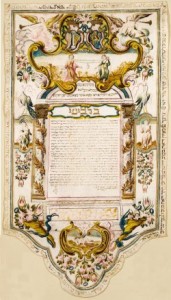The Jewish Museum Hosts “Lyrix”
 At the invitation of German Cultural Radio, schoolchildren appeared at the Jewish Museum Berlin on 13 June 2014 to write poetry with professionals from the literature scene. The theme was partnership. They turned for inspiration to a ketubah (marriage contract) from the current special exhibition “The Creation of the World” and the poem “marriage” by Kathrin Schmidt (which you can see in the original German on the Lyrix page of the radio’s website).
At the invitation of German Cultural Radio, schoolchildren appeared at the Jewish Museum Berlin on 13 June 2014 to write poetry with professionals from the literature scene. The theme was partnership. They turned for inspiration to a ketubah (marriage contract) from the current special exhibition “The Creation of the World” and the poem “marriage” by Kathrin Schmidt (which you can see in the original German on the Lyrix page of the radio’s website).
Poet Max Czollek guided the students, gathered in a seminar room, to free associate with the term ‘partnership.’ Words came up like marriage, devotion, trust and love (both very frequently), loyalty, and so on. But those most obvious associations aren’t actually what we need for poetry. What do we need then?
A few rooms further down, poet Nadja Küchenmeister proceeded along the same lines. One pupil said later that dividing the words into categories of ones she shouldn’t use and ones she should helped ease her fear about writing. She produced the following poem:
Pencil
A thought
grasped, packed into the paper.
I stay standing
and muse for awhile
and you stay here next to me.
The wood is warm,
it lives and breathes
shows me pictures, word for word.
And I laugh, exult, cry,
follow the lines, run away.
Paths under old trees,
voices, but I don’t hear them,
I brush lightly against the new branches,
see faces in the light.
Now when I open my eyes,
the pencil still sits in my hand.
and its wood – it still glows softly,
words are written on the wall.
(Emma, 13 years old, Felix-Mendelssohn-Bartholdy Gymnasium)
Back in Max Czollek’s room, the students are taking a closer look at the sources of inspiration they’ve turned to for their first attempts at writing. What kind of images did the illustrator of the ketubah use for partnership? What kind of partnership does Kathrin Schmidt talk about in “marriage?” She doesn’t actually use the terms that the children came up with, other than the word ‘Liebe’ (meaning both ‘love’ and ‘dear’) – and she uses it in the salutation “Liebe Schwester” (dear sister), rather than in the romantic sense. They read it: “dear sister this is not an oppressive letter from the school of swooning…”
The students find the letter very oppressive, however.
In the workshop with Kathrin Schmidt, participants also interpret her poem “marriage.” One student says: “Marriage means being committed. You convey this well in the text.” Another disagrees: “The main character is not enthusiastic about marriage.” We learn that Kathrin Schmidt is married but that entering the state of matrimony was not entirely free for her. She married in 1985 in the GDR because she and her boyfriend wanted to move from their dormitory rooms into their own apartment. The feminist poet who wrote that poem is not the same Kathrin Schmidt who taught students today: it becomes clear that poems are very personal and emotional, that they reflect specific experiences and periods of life, which then transform.
Daniela Seel takes the discussion about partnership in the seminar room much farther. Here they’re talking about the relationship between Otto and his pug dog in “ottos mops,” the Ernst Jandl poem, the letter ‘a,’ and the partnership between poets Jandl and Friederike Mayröcker. After a reading of the Mayröcker poem “WHAT I CALL YOU WHEN I THINK OF YOU AND YOU AREN’T THERE,” the participants invent words to describe the people they’re close to. One result of the workshop:
For the little pear tree fairy
You, the meadow princess, stand in the garden
together with the acorn king
and throw chestnuts.
A bicycle sun, a summer dream,
a mud monster, and a story sorceress.
Bird’s savior and doll’s mommy.
You conjure happiness onto my face.
You paint like a rainbow artist.
Crystalline child.
(Clara, 13 years old, Felix-Mendelssohn-Bartholdy Gymnasium)
It has begun. Now we’re excited to see what poems will appear at Lyrix over the next few weeks.
Diana Dressel and Nina Wilkens, Education
